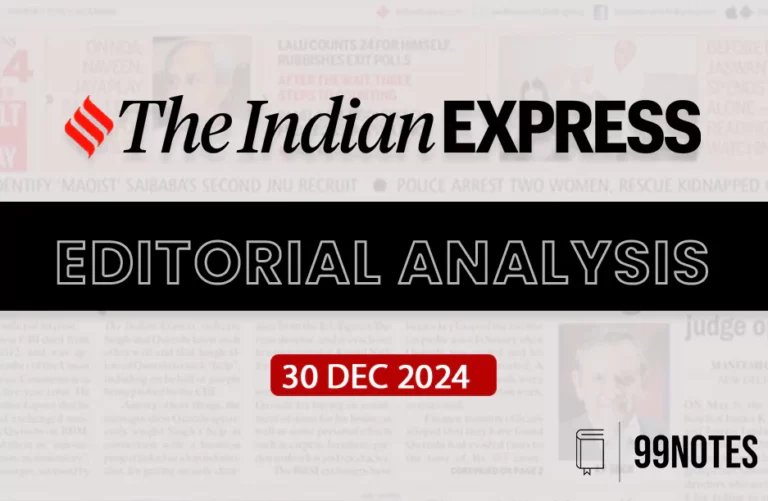4 September 2024 : The Hindu Editorial Analysis
1. A discourse on AI governance that India must shape
(Source – The Hindu, International Edition – Page No. – 8)
|
Topic: GS2 – Governance, GS3 – Science and Technology |
|
Context |
|
● The article highlights India’s role in shaping global AI governance at the upcoming 2024 Summit of the Future, focusing on bridging the digital divide and advocating for the Global South. ● It contrasts U.S. and China-led resolutions on AI, emphasising India’s strategic position in ensuring equitable, inclusive, and ethical AI frameworks. |
Introduction: India’s Role in Global AI Governance
- The Summit of the Future, scheduled for September 2024, is a crucial event where global leaders and stakeholders will convene to advance the Global Digital Compact (GDC) under the United Nations.
- The GDC aims to build a collaborative framework to bridge the digital divide, achieve Sustainable Development Goals (SDGs), and ensure a secure and inclusive digital environment.
- A key focus is to strengthen international governance of emerging technologies, especially Artificial Intelligence (AI), aligning with fundamental rights and values.
- India is urged to actively shape international discourse on AI governance, ensuring it serves its developmental priorities.
Geopolitical Contestation in AI Governance
- Two key AI-related resolutions have recently been adopted at the United Nations General Assembly (UNGA), reflecting geopolitical contestation between the U.S. and China.
- The S.-led resolution on “Safe, Secure and Trustworthy AI for Sustainable Development” advocates a harmonised approach to AI governance, focusing on shared ethical principles, transparency, and data protection.
- The U.S. aims to assert dominance in AI technology and its development.
- The China-led resolution on “Enhancing Cooperation on Capacity Building of AI” prioritises equitable AI benefits, bridging the digital divide, and creating a non-discriminatory business environment.
- China positions itself as a key player in global trade and technology standards.
- These resolutions reflect each nation’s strategic interests, highlighting the broader geopolitical contestation in digital governance.
The UN as a Platform for AI Governance
- The UN is becoming the central forum for shaping global standards on AI, given AI’s profound impact on societies and markets.
- India, with its long-standing engagement at the UN, G-20, and Global Partnership on Artificial Intelligence (GPAI), has the opportunity to ensure that the GDC aligns with its developmental goals and ethical standards.
- India can advocate for the interests of the Global South and bridge the global digital divide through its active participation.
India’s Historical Legacy at the UN
- India has a deep historical legacy at the UN, particularly in advocating for the Global South in international climate negotiations.
- India’s leadership in the UNGA Resolution 44/207 (1989) helped integrate the principle of Common but Differentiated Responsibilities (CBDR) in climate agreements.
- This principle ensured that developed countries bore more responsibility for climate change.
- India played a key role in shaping the United Nations Framework Convention on Climate Change (UNFCCC) and the Kyoto Protocol, ensuring that developing countries were not subjected to obligations that hindered their development plans.
- India formed coalitions like the Green Group and BASIC Group to safeguard its developmental and poverty reduction objectives.
India’s Role in AI Governance for the Global South
- India faces unique challenges, including a lack of advanced AI infrastructure, quality data, and capital, similar to other Global South countries.
- Just as India advocated for differential needs in climate negotiations, it should push for fairness, equity, and accessibility in AI governance.
- India’s advocacy for these principles is already evident in the G-20 New Delhi Leaders Declaration and the GPAI Ministerial Declaration.
- India’s leadership at the UN can ensure that the voices of developing countries are included in global AI governance, prioritising equitable access and technical capacity building.
Redefining the Multi-stakeholder Model
- India has an opportunity to redefine the multi-stakeholder model to be more inclusive by involving marginalised and under-represented groups from the Global South.
- This model should be accessible to smaller non-governmental organisations (NGOs), small and medium enterprises (SMEs), and other groups lacking resources for global discussions.
- India should advocate for AI systems that are inclusive, fair, and representative of diverse perspectives, aligning with human rights and international laws.
Challenges in the U.S.-China AI Discourse
- The current AI governance discourse is largely driven by the strategic interests of the U.S. and China, sidelining the concerns of the Global South.
- There are stark disparities between developed and developing countries in AI advancements. While developed countries have abundant resources, many developing nations lack basic infrastructure, internet access, and electricity.
- A localised understanding of these challenges is necessary for effective global AI governance frameworks.
Conclusion
- India’s experience as a Global South country, combined with its historical legacy of advocating for the Global South, positions it well to lead discussions on equitable AI governance.
- Active participation by India will not only advance its interests but also ensure a balanced and sustainable digital future that benefits all nations.
|
PYQ: Introduce the concept of Artificial Intelligence (AI). How does AI help clinical diagnosis? Do you perceive any threat to privacy of the individual in the use of Al in healthcare? (150 words/10m) (UPSC CSE (M) GS-3 2023) |
|
Practice Question: Discuss India’s potential role in shaping global Artificial Intelligence (AI) governance at international forums like the United Nations, particularly in advocating for the interests of the Global South. (250 Words /15 marks) |
2. Take on the challenge of rising income inequality
(Source – The Hindu, International Edition – Page No. – 8)
|
Topic: GS2 – Social Justice, GS3 – Indian Economy |
|
Context |
|
● The article addresses the global challenge of income inequality and explores strategies to foster a more equitable society. ● It emphasises progressive taxation, education, fair labour laws, infrastructure investment, and contributions from the super-rich, while advocating for decentralised development, SME support, and a tech-driven, inclusive economic model for the future. |
Progressive Taxation
- Progressive tax policies are vital for redistributing wealth and fostering a more equitable society.
- Tax revenue should be directed towards improving public goods such as healthcare, education, and job creation, rather than focusing solely on income transfer from the rich to the poor.
Education and Skill Development
- Access to quality education, lifelong learning, and skill development is essential to enhancing employability and boosting income for individuals, especially in marginalised communities.
Fair Labour Laws
- Ensuring that workers benefit from economic growth involves enforcing labour rights, minimum wages, safety standards, and collective bargaining.
- Eradicating child labour and ensuring fair treatment in the workplace are critical to building an inclusive economy.
Investment in Infrastructure
- Investment in infrastructure, particularly in areas such as water, sanitation, energy, and transportation, is critical to reducing regional disparities and ensuring sustainability.
- A focus on environment-friendly and climate-resilient infrastructure can foster both inclusivity and long-term development.
Contribution of the Super Rich
- Initiatives like the Giving Pledge, led by Bill Gates and Warren Buffet, encourage the super-rich to donate half of their wealth for the public good.
- As of 2023, over 235 billionaires in 28 countries have pledged around $600 billion.
- In India, income inequality is stark, with the top 1% holding a significant portion of the nation’s wealth.
- The World Inequality Lab has highlighted that India’s inequality is now worse than during colonial rule.
Inclusion and Equity
- There is a need for redistributive policies without targeting the middle or wealthy classes unfairly.
- India has made significant progress in lifting millions out of poverty, but bolder and innovative solutions are needed to continue this momentum.
- The new economics should focus on inclusion, equity, and sustainability to meet the country’s developmental goals.
- India needs a policy framework that ensures growth with justice and hope.
Gandhian Model of Development
- The article advocates for a Gandhian development model, focusing on local needs, local resources, and decentralisation to boost employment and prosperity.
- Investment in small and medium enterprises (SMEs) and local innovations is critical. However, banks tend to favour large corporations, a trend that needs to shift towards supporting SMEs with the help of digital technologies.
- India’s 800 districts have unique talents and resources that can be harnessed through digital platforms to build local supply chains, markets, and production centres.
Conclusion
- Despite the rise of AI, future jobs will come from sectors like food production, education, health services, tourism, and manufacturing.
- A new tech-economic model based on decentralisation, digital platforms, and sustainability will drive inclusion and prosperity.
- A lifestyle shift is needed from conspicuous consumption to one valuing happiness, sharing, and caring for a more inclusive and sustainable future.
|
Practice Question: Discuss the key factors contributing to income inequality in India and suggest measures to promote inclusive economic growth. (250 Words /15 marks) |




